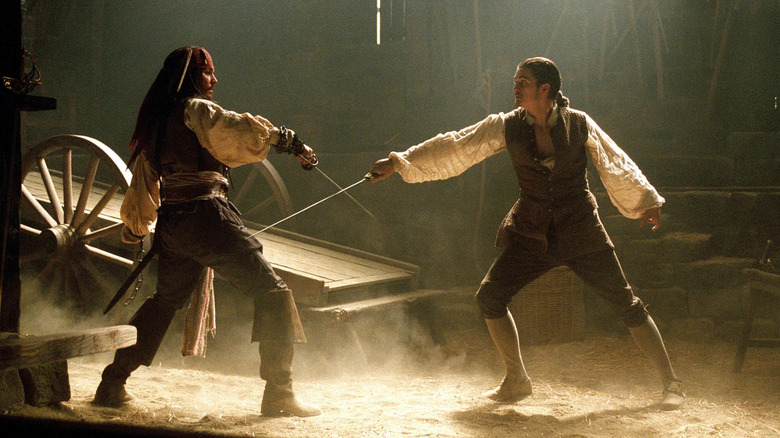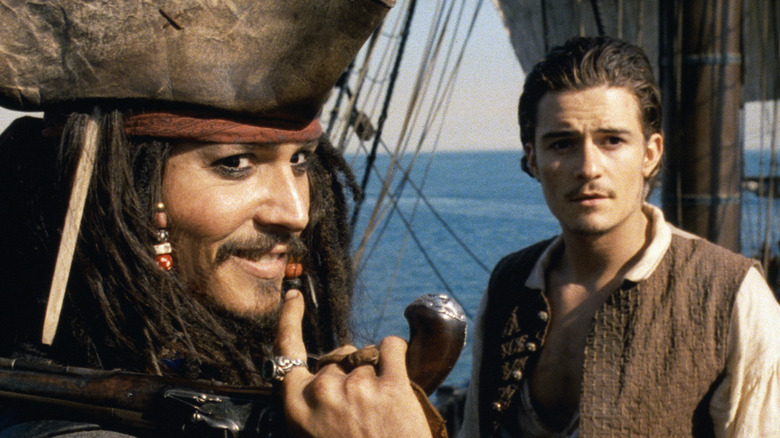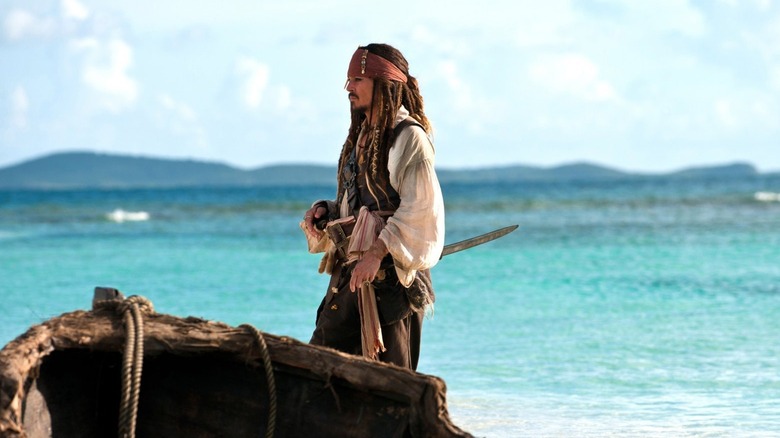Why Hans Zimmer Thought Pirates Of The Caribbean Was The 'Worst Idea Ever'
The first "Pirates of the Caribbean" film may now be regarded as a seminal piece of blockbuster filmmaking, but there was a time when many filmmakers wrote off the risky endeavor. In an era when it seemed pirates were no longer apt for the big screen, the Gore Verbinski-helmed movie wanted to reshape the theatrical landscape and give the genre an exciting, original tale. The ambitious mission was led by Johnny Depp's (career-defining) role as Jack Sparrow, but that aspect was also questioned before the release of "The Curse of the Black Pearl." And that's not all — even the creative talent behind the project was doubtful of the film's success.
Hans Zimmer, who composed music for four films of the long-running film series, was especially skeptical when Verbinski pitched him the idea of scoring the first installment. The composer had good reason to be dubious about joining the first "Pirates of the Caribbean," but Verbinski believes that skepticism surrounding the project helped cultivate the film's unique personality. Not only did it jumpstart a record-breaking film series, but it birthed a formula that pushed pirate movies back into the mainstream.
'That's the worst idea ever'
In an interview with Collider, the director claimed that Zimmer's reaction to his pitch was a by-product of the admittedly crazy nature of the project:
"I would say that Pirates 1 had an energy to it, which was essentially, 'you're crazy'. I remember pitching it to [Hans] Zimmer and he said, 'You're mad! You're making a pirate movie? Nobody's going to see a pirate movie.' It was resoundingly, 'that's the worst idea ever.'"
Naturally, Zimmer went on to compose the next three films of the franchise. No matter how doubtful he was, even Zimmer sensed something special was in the works. It's true — pirate movies were not all the rage and it was a safe bet that "Pirates of the Caribbean" would crash and burn. But the risk was a part of the attraction. Verbinski continued: "And there was something exciting about that. It was so doomed to fail ... there's so much historical proof that it will not work." Even if they had failed, "Pirates of the Caribbean" would have at least tried something different in a genre that was declining in popularity.
Of course, Verbinski's plan to subvert expectations and spend (a lot) of Disney's money for a zany pirate adventure paid off in spades. That uneasy feeling of treading new ground allowed the first film to be unconventional, even if it meant the sequels would have to follow that blueprint.
Pressure made diamonds
On top of being a pirates movie, the first "Pirates of the Caribbean" featured a bevy of unknown variables that could implode the project as soon as it docked in theaters. From Depp's uncharacteristically vibrant performance to the zig-zag nature of the narrative, Verbinski stated that just about everything made them nervous:
"So, you're making everybody nervous. The studio's nervous. Everybody's nervous about Johnny Depp's performance. Everybody's nervous about the story. It's convoluted — they're returning the treasure, wait they've taken the treasure back, they're cursed? Everything about that had a spirit of madness to it."
Once "Pirates of the Caribbean: The Curse of the Black Pearl" was released, their entire perspective on the film changed drastically, for better or worse. The studio not only became confident in the once-risky pirate saga but mandated back-to-back sequels. Verbinski deems it the start of the "release date-driven experience," which coincidentally created an entirely new reason for anxiety behind the blockbuster production. In a situation where "you don't have scripts and you're making a movie to a release date," Verbinski found himself wanting to go back to not delivering exactly what the audience wanted: "I would have these conversations that would be, 'we need to get back to not knowing.'"
I'd argue that the strategy is what makes his two sequels "Pirates of the Caribbean" — "Dead Man's Chest" and "At World's End" — the most daring installments of the franchise, even if they don't reach the heights of the first film. From start to finish, Verbinski's trilogy had a lot of pressure riding on it, but that was a part of why it succeeded.


